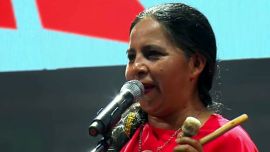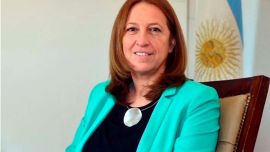Cristina Fernández de Kirchner began legal action against Google this week, seeking “millions of dollars” in damages from the Silicon Valley giant, according to her lawyer, Gregorio Dalbón. The former president’s complaint relates to with a highlighted search result (known as a knowledge graph), in which her title appeared as “Thief of the Argentine nation” instead of, as it should read, “vice-president.” According to Cristina and her legal team, which also includes Luis Goldin and Carlos Beraldi (who is set to join President Alberto Fernández’s “expert” committee on judicial reform), Google is directly responsible for damaging the VP’s reputation, a situation exacerbated by the platform’s reach, which will result in a blockbuster settlement which they will then donate to a children’s hospital in Cristina’s hometown of La Plata.
The underlying claim is noble, as is Cristina’s tweet asking: “Is there any form of defence for the victims of these types of actions perpetrated by a tech giant like Google?” But, as everything with Mrs. Fernández de Kirchner, it is important to be critical and have a long memory – not only did she use the state apparatus and its resources to persecute and spy on her opponents while in office, her digital militants are still active today, controlling important parts of the Wikipedia community, which has become the de facto definer of truth in our times, forming most people’s first opinion on things. Thus, while Cristina and her crew have managed to blind their Wikipedia profiles, which are generally the first search result in Google, those who have been critical to her have seen their profiles defaced with untruthful and damaging information.
Midnight, May 17, 2020. CFK was browsing the web and came upon a journalistic article in Clarín that revealed that a Google search for her name would call up a page maliciously referring to her as a crook. It soon went viral and it was quickly noted by Google employees, who within hours had corrected the supposed mistake. A month and a half later, Fernández de Kirchner’s legal team requested that Google hand over evidence pertaining to the incident, including specific information regarding how many people had seen her picture coupled with the moniker “Ladrona de la Nación República.”
It’s unclear whether the former president is aware or not, but a silent culture war is being fought in the digital theatre. Wikipedia is one of the main battlegrounds. The site and Google have a long history, of competition at first and interdependence going forward. As the modest entry in Wikipedia points out, back in 2007 Google launched a direct competitor to “The Free Encyclopedia,” Knol, which was eventually discontinued in 2012. Starting in 2010, Google — which was founded by Sergey Brin and Larry Page — started donating money to the Wikimedia foundation. Two years later, the world’s largest and absolutely dominant search engine launched the “Knowledge Graph,” which it defines as “a knowledge base used by Google and its services to enhance its search engine’s results with information gathered from a variety of sources.” It mainly relies on Wikipedia. By 2018, Google and Wikipedia had become partners, joining forces to lobby against European Union Copyright Directive being pushed by European publishers, which sought to get the titans of tech to pay for the use of their content. Together, they spread disinformation, including the claim that the new directive would include a “link tax” that would destroy Wikipedia and other types of user generated content (including memes). Wikipedia “went dark” on July 4, 2018, to protest the vote, and the following year thousands of young activists protested in Europe’s capitals. While the EU Copyright directive was indeed controversial, it was clear that it would not harm Wikipedia, nor lead to the passage of a generalised link tax, or even kill memes.
Wikipedia is one of today’s most important arbiters of truth, by virtue of its incredible capacity to lead Google’s search rankings. A 2012 study showed that Wikipedia ranked first in Google search results for 99% of terms selected with a random noun generator in the UK. From kids working on a school project to a group of friends debating who scored the winning goal in the 1986 World Cup final, Wikipedia is the first “trusted” source that most people turn to. With Google’s Knowledge panels, which highlight important information about a specific search entity such as a famous politician (search for Cristina and you will see a large box on the right hand of your screen with her name, title, a picture, a five line biography, age, presidential term, office, party, names of her book and children, social media pages, and related searches). This has lead zero-click searches to surge to more than 50 percent of queries, according to a study by SparkToro, meaning most people are forming their opinions on most things thanks to the information being highlighted by Google, which again, mainly comes from Wikipedia.
While Wikipedia is an “openly editable,” collaborative website, its community is controlled by a hierarchy that ultimately decides the direction of editing. While this may seem ideal, there are cases, such as in Argentine politics, where it can go awfully wrong. Kirchnerite militants have joined Wikipedia and rewritten articles about Fernández de Kirchner to favour her,” Clarín’s media editor Alejandro Alfie has said. He argues that Wikipedia profiles in Argentina have a strong bias favouring Kirchnerismo that is critical those in opposition to her. “The cases of Mauricio Macri and Cristina [Fernández de] Kirchner are the clearest examples,” Alfie wrote, “allowing one to see the double standard with which Argentina’s most consulted encyclopedia is being run, with multiple positive statements about [Fernández de Kirchner] and several negative statements about [ Macri].” Critical journalists, opposition politicians, and certain corporations have clearly vandalised profiles, and Kirchnerites have their profiles secured by cyber militants.
The “Thief of the Argentine Nation” incident is but one skirmish of this seemingly invisible war. That specific correction seems to have been live for only five minutes in a day that includes 35 corrections until an editor “protected” the term due to “excessive vandalism,” as the Wikipedia revision history shows.
Whether Google is responsible or not for the content it highlights is as important an issue as to whether cyber militants can have control over the most widely consulted encyclopedia in the world. These are important matters, and it would be valuable if Cristina looked at both sides of the coin – yet, with her selective memory, it isn’t surprising that she only cares about the side that benefits her.


















Comments